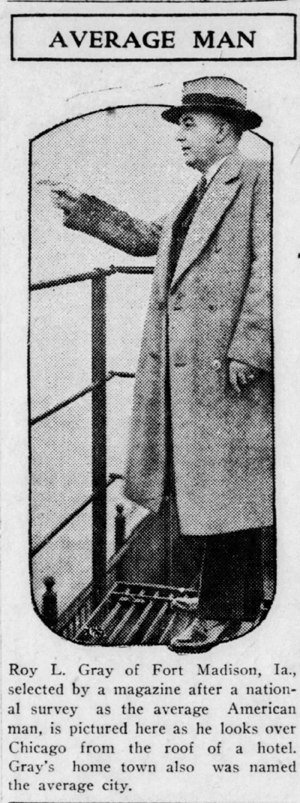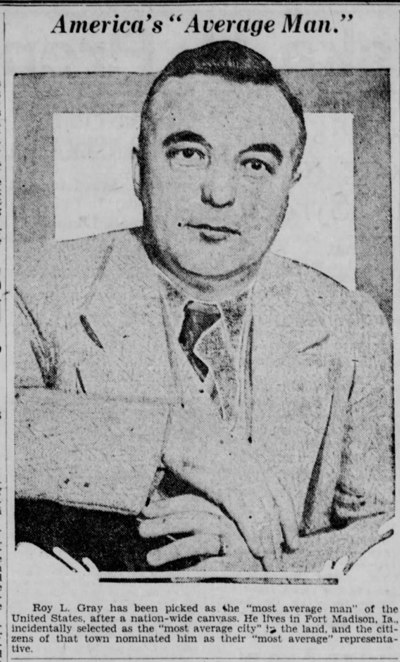Boredom
Roy L. Gray, the Most Average Man
In 1927, William S. Dutton, a writer for American magazine, decided to locate America's most average man. The requirements were that whoever it was had to be:To conduct his search, Dutton used the census report, a map, and a weather chart to select America's most average city, which he decided was Fort Madison, Iowa. Then he conducted a survey of Fort Madison's residents to determine who the most average man living there was.
He finally settled on Roy L. Gray, owner of a clothing store. Gray was 43 years old, married, and had two children.
Dutton knocked on Gray's door and informed him that he was the most average man in America. Gray seemed to take the news in stride. He agreed to an interview, and then was whisked off to Chicago where he was given the VIP treatment, which included getting to meet the mayor. Then he returned to his average life, and as far as I can tell never made the news again.
He should have tried to hook up with Miss Typical.

Rushville Daily Republican - Oct 26, 1927

The Lincoln Star - Oct 25, 1927
Posted By: Alex - Thu Feb 16, 2017 -
Comments (3)
Category: Awards, Prizes, Competitions and Contests, Boredom, 1920s
Hedge Laying Championships
Their homepage.
Posted By: Paul - Thu Aug 04, 2016 -
Comments (1)
Category: Boredom, Contests, Races and Other Competitions, Eccentrics, Horticulture and Gardens, Europe, Natural Resources
Trimming Beets for Victory!
WWII was won through strategic use of beets--apparently. No sound on this video.
Posted By: Paul - Mon Mar 07, 2016 -
Comments (7)
Category: Agriculture, Boredom, Food, PSA’s, War, 1940s
The Life Cycle of the Pin Mould
"If a ripe head is squeezed, an enormous number of little things fastened together in a sticky mess are jerked out."
They teach this filth in our schools!?!
Posted By: Paul - Tue Sep 22, 2015 -
Comments (3)
Category: Boredom, Hygiene, Innuendo, Double Entendres, Symbolism, Nudge-Nudge-Wink-Wink and Subliminal Messages, Nature, 1940s
Crosscut Saw Filer
You know, I was actually getting into this a little bit, finding the esoteric knowledge somewhat alluring. But five parts adding up to over two hours? I'm gonna call the total program a fit candidate for our "Boring Video" competition.
Posted By: Paul - Mon Aug 24, 2015 -
Comments (6)
Category: Boredom, Eccentrics, Tools
Sitting and Smiling
Benjamin Bennett has currently uploaded 84 videos to YouTube. They all share the exact same premise. In each video he sits in front of the camera and smiles — for four hours.His unwavering adherence to the concept has, by now, earned him status as a minor Internet celebrity. (And what higher goal can one really seek in life than to be famous online?)
His most popular video is Sitting and Smiling #5 (below), because this includes a brief moment of drama. In Bennett's own words:
You can see this happen at 2:36:30.
As it turns out, the doors were locked, and he had broken one open. We found nothing missing, as there is not really anything of value in the house other than the laptop I was using to webcast.
Posted By: Alex - Sun May 17, 2015 -
Comments (6)
Category: Boredom, Eccentrics, Video
My human time
Man sits in front of the camera for 24 hours. The result is 3 videos, each 8 hours long. Every minute his computer chimes, and he says what time it is. He claims this is the "most boring video ever." He's possibly correct.I suppose that if you managed to sync the time in the video with the time in real life, you could have the video running continuously and use it as a speaking clock. Or you could just ignore the video, like the rest of the world.
Posted By: Alex - Fri Apr 17, 2015 -
Comments (9)
Category: Boredom, Video
Bookkeeping and You
More patented boredom for your snooze-inducement.
Posted By: Paul - Tue Feb 10, 2015 -
Comments (2)
Category: Boredom, Teenagers, Documentaries, 1940s
Maine man counts one million peas to win bet of $2.50
Life moved at a slower pace in Meddybemps, Maine back in 1922. Probably still does. According to Wikipedia, the 2010 census listed Meddybemps as having a population of only 157.To win a wager of $2.50, Henry Parish of Meddybemps, Me., has spent nearly a month counting peas. His eyes are in such condition that whether open or shut he sees peas and quart cans. When he sleeps he dreams of peas and quart cans.
On Washington's birthday, Parish and a neighbor named Wainwright engaged in an argument.
"Bet you $2.50 I can count a million peas between now and the middle of March," said Parish.
"I'll take that bet," said Wainwright. "You count them and put them in glass fruit jars."
Parish began. He took all his wife's empty fruit jars and all the peas he could borrow, and by Saturday night he had counted 100,000. This gave him hope, and he began to boast to Wainwright.
"I'll tell you what I'll do," said the latter. "If you count the peas without making a mistake, I'll eat them all in two weeks; if you overcount or undercount you eat them."
Parish took this bet and counted the first batch over again to be sure he had made no error. Finding that he was three peas out of the way he got nervous.
A couple of days ago Parish finished in a rush and took all the cans over to Wainwright's house.
"There's the peas. Now eat them," he commanded, "and fork over the $2.50."
"But how do I know you have counted correctly?" protested Wainwright.
"You don't, so count them yourself," chuckled Parish.
"Well, I guess I'll take it for granted if you'll let me off on eating them," said Wainwright, after thinking it over. "I'll pay you the $2.50 and call it square."
"Oh, no, you don't," gurgled Parish; "a bet's a bet and you've got to count them. Then I'll bet you have to eat them."
Wainwright is now counting peas to see whether he does or does not eat them.
Posted By: Alex - Mon Nov 24, 2014 -
Comments (8)
Category: Boredom, 1920s
Corn Husking Championship
I can hardly wait to see who wins this year.
Posted By: Paul - Sat Sep 13, 2014 -
Comments (5)
Category: Agriculture, Boredom, Contests, Races and Other Competitions, 1930s

| Who We Are |
|---|
| Alex Boese Alex is the creator and curator of the Museum of Hoaxes. He's also the author of various weird, non-fiction, science-themed books such as Elephants on Acid and Psychedelic Apes. Paul Di Filippo Paul has been paid to put weird ideas into fictional form for over thirty years, in his career as a noted science fiction writer. He has recently begun blogging on many curious topics with three fellow writers at The Inferior 4+1. Contact Us |





